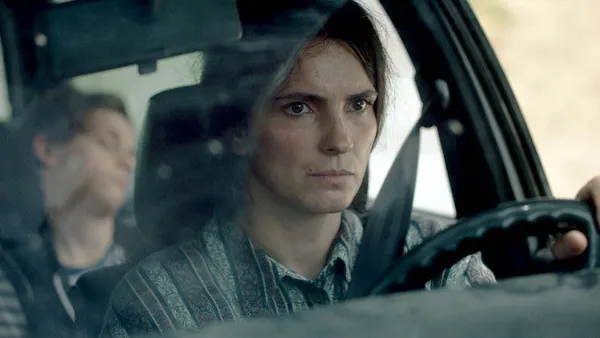Eye For Film >> Movies >> Hive (2021) Film Review
Hive
Reviewed by: Jeremy Mathews

When people talk about cinema’s great badasses, they’ll probably never mention Fahrije. And that’s a damn shame. Admittedly, the protagonist of Blerta Basholli’s quiet drama Hive doesn’t get to smash any heads or deliver cool one-liners, but few characters are tougher or more resilient than she is. It turns out that in the right context, learning to drive a car can be bold and adversarial.
Played by Yllka Gashi, Fahrije is a victim of awful circumstances in a time and place — post-war Kosovo — in which many other women are in the same awful circumstances. Her husband has been missing since the massacre, and is likely dead, even if no one wants to admit it. She’s left at home, tending to her husband’s old beehives, usually getting stung in the process. The grief she experiences alone would be too much for many to take, but the persecution placed on top of it make it almost unbearable. Yet she must push on, in a society that doesn’t want her to succeed or even to try to make a living.
Writer/director Basholli directs with a deceptively simple handheld aesthetic, emphasising the bleak reality of the setting. It would have been easy to play up sympathy for what the main character goes through or pump up the melodrama, but the austerity lets Gashi’s performance speak for itself, and makes it more rewarding in long run.
The story lands in less than 90 minutes thanks to strong economic storytelling. The size and scope of the widow community, along with the restrictions and fears they face, is established in a simple meeting. An organisation offers an opportunity for the women to take driving lessons, so that they can run errands that are impossible to run without a husband driving the car. No one volunteers out of fear that they’ll be shunned for abandoning their husband and humiliating their family.
Fahrije shares the reluctance. She lives with her wheelchair-using father-in-law and two kids who are still working through the grief of losing their father, and becoming a pariah won’t help things at home. But she is gradually convinced that someone needs to be able to help all the women complete essential tasks.
The ability to drive brings outrage in the community, but it also brings confidence. She soon becomes determined to lead the women an ajvar business — if only because no one else is willing to lead it. The women already know how to make the popular bell pepper-based condiment, and it gives them an opportunity to earn income while also fostering community.
The whole ensemble is strong, Gashi stands out in what’s sure to be one of the year’s best performances. From the opening when she’s desperately looking for her husband’s remains among recovered clothes to her learning about how to market product, the camera never leaves the character for very long. And she always stays emotionally genuine — fragile and scared, but never unwilling to do what needs to get done. And it’s all recorded in a film that doesn’t pander, but also doesn’t flinch.
Reviewed on: 03 Feb 2021
















